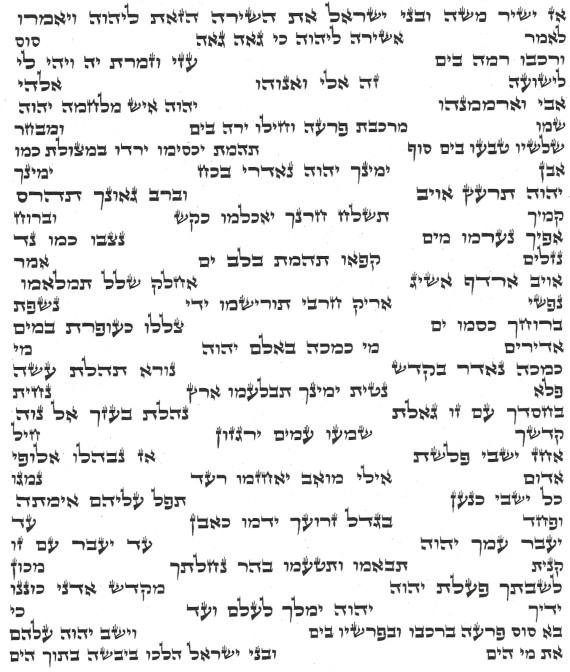
Early yesterday morning, during my morning prayers at Yeshivat Hadar, I came across an interesting passage in the Zohar, the enigmatic, poetic, foundational opus of Jewish mysticism:

The footnote explained:
"...to be read from above to below, beginning at the top right. This verse corresponds to Tif'eret, who embraces Hesed and Gevurah. Although appearing in columns, the letters proceed in normal sequence. ... In English the verse reads: And Moses stretched out his hand over the sea, and YHVH drove the sea with a might east wind all night, and He turned the sea into dry ground, and the waters were split."
I thought this was intriguing enough to share on any random day in the week of Tiferet in the Omer, so I headed to work aiming to do just that.
But then I took another look at the book and saw that the verse here is the 21st of Exodus 14:
וַיֵּט מֹשֶׁה אֶת-יָדוֹ עַל-הַיָּם, וַיּוֹלֶךְ יְהוָה אֶת-הַיָּם בְּרוּחַ קָדִים עַזָּה כָּל-הַלַּיְלָה, וַיָּשֶׂם אֶת-הַיָּם לֶחָרָבָה; וַיִּבָּקְעוּ הַמָּיִם
Given that yesterday was 20 days in the Omer, I figured I should wait until today (Day 21) to share. Then I thought a little more about it and realized that there could be a some connection between Tiferet (when understood as harmony) and what comes right after this verse in the Torah: the Song of the Sea.
So I emailed Danny Matt, the translator and footnote-writer of this particular edition of the Zohar, and asked: Is there any discussion of such a connection elsewhere in the text?
He soon responded:
The Zohar doesn't make that particular connection, but it's certainly interesting. The entire Name of 72 provided to power to split the sea.
What's rather amazing is that this unique divine name is discussed at length only twice in the whole Zohar, and I happen to be working on the second discussion right now, in Zohar on the book of Numbers.
Amazing! This "coincidence," even couched as it was in the fact that the kabbalistic text doesn't actually or explicitly explore the connection between this verse (Exodus 14:21) and the Song of the Sea (Exodus 15:1-18), was remarkable enough.
But mystery of mysteries, there had to be more to unearth. Says the Tanya: "The divine radiance manifests its power and potential in the element of the physical earth in an immense manifestation, in more enormous strength than elements transcending it, even the hosts of heaven."
Moses, in conjunction with God, "turns the sea into dry ground," allowing the newly freed Israelites to cross to safety. A midrashic account of the splitting of the sea, retold by Maggid Yitzhak Buxbaum, describes the event in vivid detail:
Serach bat Asher said: The waters of the Red Sea split open, and the heavens opened, and I saw visions of God. I saw the Holy One above and the Shechinah below and myriads upon myriads of angels gathering to watch as we walked through the sea on dry land and the Egyptians drowned.
Search continues: "I saw it, and I tell you, the Shechinah was shining through the water, like from many windows."
The Shechinah, God's in-dwelling presence, is often synonymous with Malkhut in mystical teachings. And herein lies the connection -- or, at least, a connection -- between this day of the Omer (Malkhut within Tiferet) and the Song of the Sea, the manifestation of melody, if you will:

The words in a Torah scroll are written in long columns of bunched-together words with little-to-no space between letters, let alone sentences (and a total lack of punctuation). One major exception to this general rule of layout is the Song of the Sea, which is written with "many windows."
For more, join the HuffPost Religion virtual community by visiting the Omer liveblog, which features inspiration and teachings for all 49 days of spiritual renewal between Passover and Shavuot.